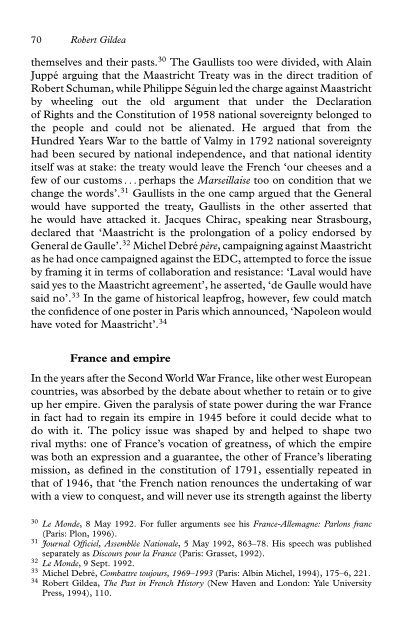Memory and Power in Post-War Europe: Studies in the Presence of ...
Memory and Power in Post-War Europe: Studies in the Presence of ...
Memory and Power in Post-War Europe: Studies in the Presence of ...
Create successful ePaper yourself
Turn your PDF publications into a flip-book with our unique Google optimized e-Paper software.
70 Robert Gildea<br />
<strong>the</strong>mselves <strong>and</strong> <strong>the</strong>ir pasts. 30 The Gaullists too were divided, with Ala<strong>in</strong><br />
Juppé argu<strong>in</strong>g that <strong>the</strong> Maastricht Treaty was <strong>in</strong> <strong>the</strong> direct tradition <strong>of</strong><br />
Robert Schuman, while Philippe Ségu<strong>in</strong> led <strong>the</strong> charge aga<strong>in</strong>st Maastricht<br />
by wheel<strong>in</strong>g out <strong>the</strong> old argument that under <strong>the</strong> Declaration<br />
<strong>of</strong> Rights <strong>and</strong> <strong>the</strong> Constitution <strong>of</strong> 1958 national sovereignty belonged to<br />
<strong>the</strong> people <strong>and</strong> could not be alienated. He argued that from <strong>the</strong><br />
Hundred Years <strong>War</strong> to <strong>the</strong> battle <strong>of</strong> Valmy <strong>in</strong> 1792 national sovereignty<br />
had been secured by national <strong>in</strong>dependence, <strong>and</strong> that national identity<br />
itself was at stake: <strong>the</strong> treaty would leave <strong>the</strong> French ‘our cheeses <strong>and</strong> a<br />
few <strong>of</strong> our customs ...perhaps <strong>the</strong> Marseillaise too on condition that we<br />
change <strong>the</strong> words’. 31 Gaullists <strong>in</strong> <strong>the</strong> one camp argued that <strong>the</strong> General<br />
would have supported <strong>the</strong> treaty, Gaullists <strong>in</strong> <strong>the</strong> o<strong>the</strong>r asserted that<br />
he would have attacked it. Jacques Chirac, speak<strong>in</strong>g near Strasbourg,<br />
declared that ‘Maastricht is <strong>the</strong> prolongation <strong>of</strong> a policy endorsed by<br />
General de Gaulle’. 32 Michel Debré père, campaign<strong>in</strong>g aga<strong>in</strong>st Maastricht<br />
as he had once campaigned aga<strong>in</strong>st <strong>the</strong> EDC, attempted to force <strong>the</strong> issue<br />
by fram<strong>in</strong>g it <strong>in</strong> terms <strong>of</strong> collaboration <strong>and</strong> resistance: ‘Laval would have<br />
said yes to <strong>the</strong> Maastricht agreement’, he asserted, ‘de Gaulle would have<br />
said no’. 33 In <strong>the</strong> game <strong>of</strong> historical leapfrog, however, few could match<br />
<strong>the</strong> confidence <strong>of</strong> one poster <strong>in</strong> Paris which announced, ‘Napoleon would<br />
have voted for Maastricht’. 34<br />
France <strong>and</strong> empire<br />
In <strong>the</strong> years after <strong>the</strong> Second World <strong>War</strong> France, like o<strong>the</strong>r west <strong>Europe</strong>an<br />
countries, was absorbed by <strong>the</strong> debate about whe<strong>the</strong>r to reta<strong>in</strong> or to give<br />
up her empire. Given <strong>the</strong> paralysis <strong>of</strong> state power dur<strong>in</strong>g <strong>the</strong> war France<br />
<strong>in</strong> fact had to rega<strong>in</strong> its empire <strong>in</strong> 1945 before it could decide what to<br />
do with it. The policy issue was shaped by <strong>and</strong> helped to shape two<br />
rival myths: one <strong>of</strong> France’s vocation <strong>of</strong> greatness, <strong>of</strong> which <strong>the</strong> empire<br />
was both an expression <strong>and</strong> a guarantee, <strong>the</strong> o<strong>the</strong>r <strong>of</strong> France’s liberat<strong>in</strong>g<br />
mission, as def<strong>in</strong>ed <strong>in</strong> <strong>the</strong> constitution <strong>of</strong> 1791, essentially repeated <strong>in</strong><br />
that <strong>of</strong> 1946, that ‘<strong>the</strong> French nation renounces <strong>the</strong> undertak<strong>in</strong>g <strong>of</strong> war<br />
with a view to conquest, <strong>and</strong> will never use its strength aga<strong>in</strong>st <strong>the</strong> liberty<br />
30 Le Monde, 8 May 1992. For fuller arguments see his France-Allemagne: Parlons franc<br />
(Paris: Plon, 1996).<br />
31 Journal Officiel, Assemblée Nationale, 5 May 1992, 863–78. His speech was published<br />
separately as Discours pour la France (Paris: Grasset, 1992).<br />
32 Le Monde, 9 Sept. 1992.<br />
33 Michel Debré, Combattre toujours, 1969–1993 (Paris: Alb<strong>in</strong> Michel, 1994), 175–6, 221.<br />
34 Robert Gildea, The Past <strong>in</strong> French History (New Haven <strong>and</strong> London: Yale University<br />
Press, 1994), 110.
















